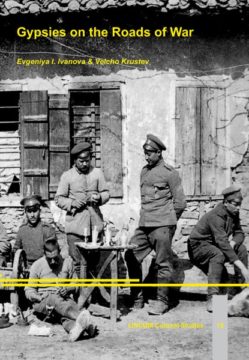The book Gypsies on the Roads of War reveals an issue unknown so far – Gypsies people in the Bulgarian Army in the period from 1878 to 1945. It depicts their participation in the wars which Bulgaria fought for its national unity and liberation and for securing a place in the modern democratic world.
Every year the Bulgarian armed forces recruited thousands of young men from different ethnic groups, of different religion and with different education, including Gypsies. At the time, apart from its specific functions to train and shape up loyal and valiant defenders of the country, the army promoted tolerance and understanding among different ethnic and religious groups. Tolerance in the army proved that no xenophobia, racism or extreme nationalism existed in the Bulgarian society. Minority communities who showed truthfulness and loyalty for Bulgaria also contributed to that status.
During World War II the Gypsies people in Bulgaria and its newly-annexed territories were neither subject to genocide, nor to any legal or repressive measures. Some of the thousands of mobilized Bulgarian soldiers were Gypsies. They were equally active participants in any events that involved the Bulgarian Army. The book tracks down the dispersal of Gypsies people from India to Europe and their role in the military structures of the Byzantine Empire, the Ottoman Empire and the Medieval Bulgarian state in different historical periods.
Velcho M. Krustev and Evgeniya I. Ivanova are associate members of the section “Bulgarian Ethnology” at The Institute of Folklore and Ethnography of the Ethnographic Museum, Bulgarian Academy of Sciences.
A short description of academic interests and research expertise:
Notable interest in the study and exhibition of the history and ethnic-culture of the Romani. He works for the social integration of the Romani community in the Bulgarian society through research and making accessible their intellectual culture, traditional human virtues, lifestyle and traditional crafts.
ISBN 978 3 86288 727 9. LINCOM Cultural Studies 15. 376pp. 2016.
- Veröffentlicht am Mittwoch 28. September 2016 von LINCOM GmbH
- ISBN: 9783862887279
- 376 Seiten
- Genre: Gesellschaft, Politik, Sachbücher, Wirtschaft
